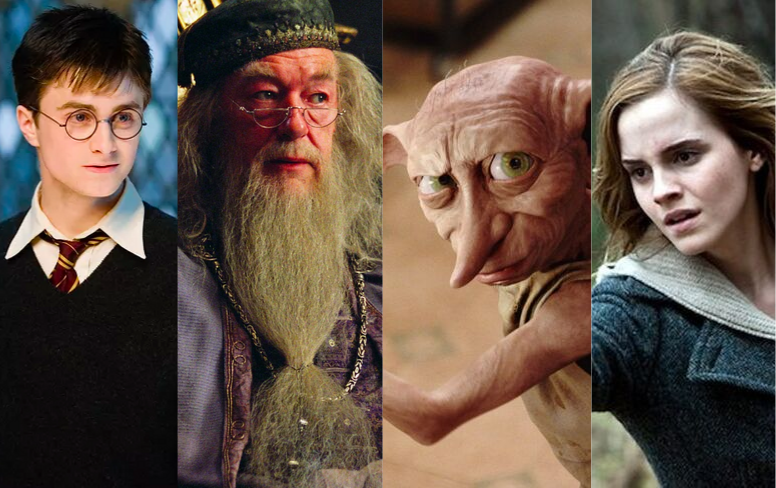The Darker Shades of the Wizarding World Heroes
September 28, 2019—In Episode 5 of Dwelling on Dreams, Victoria and I discuss Garrick Ollivander and his general indifference to moral absolutes. We contrast his decisions with those of other characters who have stronger senses of right and wrong, the traditional “good guys” of the universe.
But not all of these figures are squeaky clean. Many of the great heroes of the Wizarding World make choices that one could consider “grey areas” at best. Let’s explore a few behavioral lowlights for some of our favorite characters. As always, Cursed Child does not exist, and you’ll never convince me otherwise.
(Excluded from this list are actions that are acknowledged as wrong within the series itself. You can see a few of the big ones in the Honorable Mentions list at the bottom of this post.)
Harry
He casts Unforgivables (as does McGonagall)
Harry tries to cast the Cruciatus Curse for the first time when he is fifteen. It fails, but the Dark witch he tried it on, Bellatrix Lestrange, gives him a few pointers, and he takes them to heart.
When he tries it again two years later on Amycus Carrow (in a fit of righteous fury when the latter spits in Minerva McGonagall’s face), he finally manages to cast it correctly. Yay?
Then, instead of being horrified, a shocked McGonagall calls the act “gallant” and proceeds to cast the Imperius Curse on Carrow when he starts to stir.
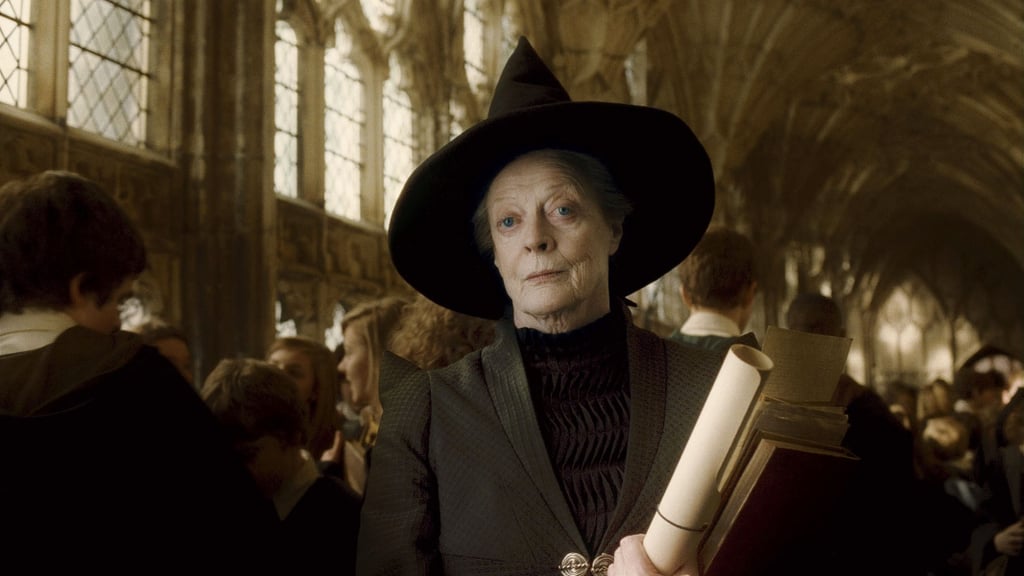
Harry also uses the Imperius Curse when breaking into Gringotts, on both Bogrod the goblin and Travers the Death Eater. The two are skeptical of the disguised Hermione, questioning her cover as the notorious Bellatrix, so Harry casts the spell to control them and avert suspicion. In this case, though, he uses an Unforgivable in the service of a larger purpose, and Hermione’s and Ron’s lives are very much at stake.
He emotionally manipulates Slughorn while he’s vulnerable
Dumbledore orders Harry to coax Horace Slughorn into surrendering one of his private and most closely guarded memories. Harry proceeds to get Slughorn drunk and then verbally weaponize his parents’ deaths and Slughorn’s fondness for Lily Potter to get that memory.
Harry is under the influence of Liquid Luck at the time, and therefore perhaps not entirely in control of his own actions, and, again, the choices are in the service of the war effort. But all in all, not a banner day for anyone involved.
Hermione
She wipes her parents’ minds
I consider this to be by far the worst thing any of the three main characters ever do. Hermione Granger, champion of non-wizard rights and equality, magically erases her parents’ identities.
The implication, to me, has always been that, as Muggles, they just won’t be able to handle or understand this war that big, bad 17-year old Hermione has embroiled herself in, and that it’s better to get them out of the way and keep them happy, unencumbered by pesky things like daughters and free will. Obviously, it’s too much of a bother to give them a say in the running of their own lives when Hermione already knows how they should be run.
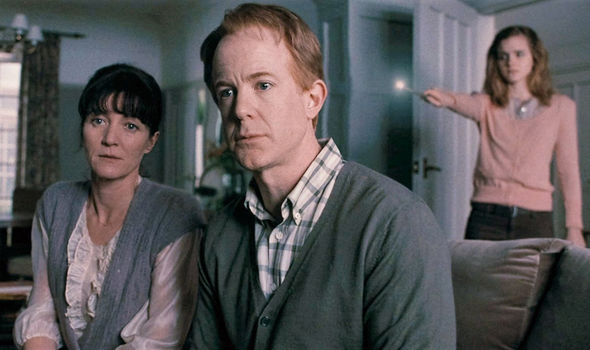
I really feel that this is super-villian level stuff, to be honest, and the fact that she does it to her parents is another level of appalling. We don’t know whether Hermione tries to convince her parents to leave on their own first, but I’m not sure which answer I’d find more disturbing. If she asks, and they refuse to flee the country without their young daughter when she is in so much danger, then it means Hermione took action to directly override their choice and replace it with the one she wants them to make.
On the other hand, if she doesn’t ask at all, it means that she respects their opinions and position as her parents so little that it’s not even worth having the conversation.
She imprisons and blackmails Rita Skeeter
I won’t belabor this point, since I’ve already touched on it in a previous post. But Hermione does in this case kidnap a human being and hold her hostage, mostly because that human being said mean things about her and Harry. Maybe she was trying to stop Rita’s spying, but there were about 74 better ways she could have done that. She only releases the reporter once she’s terrorized her for awhile and then blackmailed her to control her future behavior.
She rigs the Quidditch tryouts
This is a comparatively innocuous decision of Hermione’s, but she does pull the magical equivalent of a Tonya Harding when it looks like Ron might not win a spot on the Quidditch team. Cormac McLaggen, for all his faults, is a good Keeper, and he has not in any way cheated or faked his talent. The competition is fair, until Hermione casts a Confundus Charm on McLaggen and secures Ron’s spot for him. Harry notices her role in the outcome and says nothing, which compounds my disappointment in these two who usually have so much integrity. Does the fact that McLaggen is an obnoxious person whom nobody (including the readers) wants to tolerate in large doses really make up for her actions?
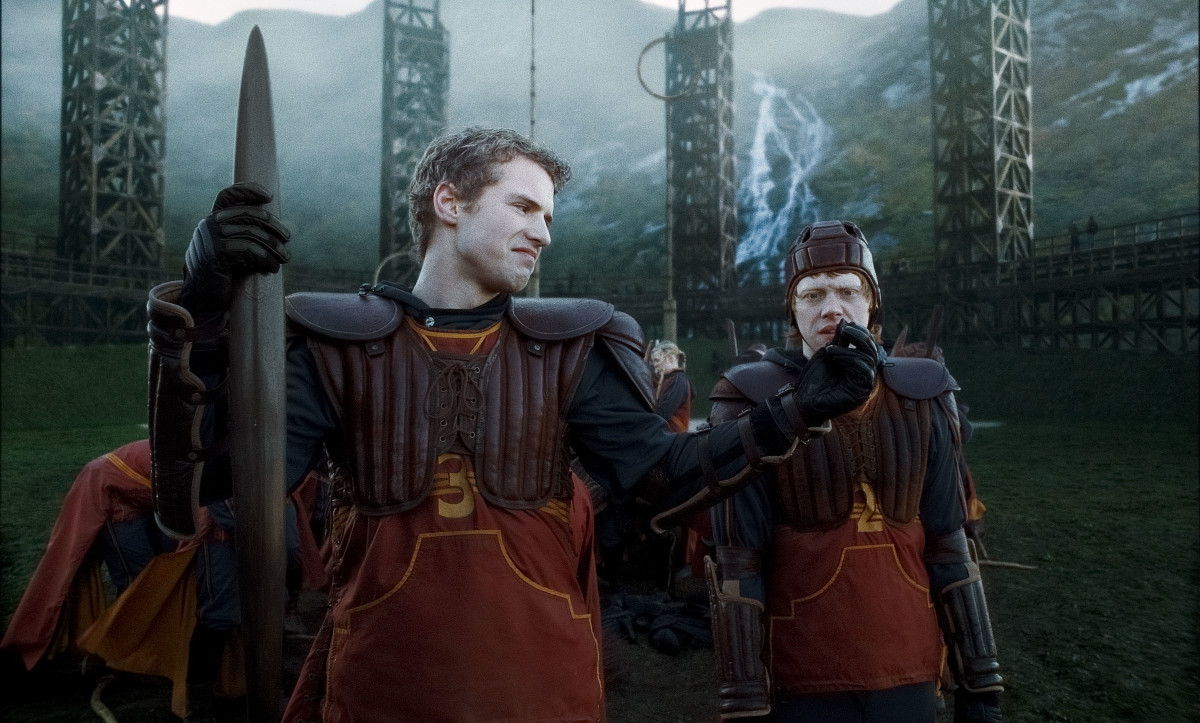
Ron: He Confounds the driving instructor
Ron is a not a perfect person; throughout the series, he makes many decisions that cause Harry, Hermione, and even Ginny pain, and his attitude often leaves something to be desired. But that’s part of growing up. Most of these actions take place in the context of a troubled teenager figuring out life and friendship and family and romance. Almost always, someone calls him on his actions, he eventually realizes when he’s in error, and they reconcile and move on.
But in the epilogue of the series, Ron mentions that he uses a mind-altering spell (Confundus again) on a Muggle in order to pass his driving test. Again, this is relatively tame, but he does use magic to cheat on a test, if you will. And no matter how you slice it, this was not in the service of a greater ideal or even to help a friend; it was for personal gain.
Dumbledore
He talks Harry into wanting to be a killer
Dumbledore makes a lot of questionable choices in the Harry Potter series, but most of them fall under the general category of “being manipulative.” He has a persistent habit of withholding inconvenient information from those it affects most and talking them into decisions that they are reluctant to make (“You must kill me”, Severus.)
But throughout the course of a particular conversation in Half-Blood Prince, Dumbledore deliberately and systematically incites Harry—a 16-year-old boy—into not just accepting that he has to kill Voldemort but actively desiring to do so. This not the same thing as pumping up an athlete before the big game. This is making a teenager eager to end another human life, vile as it may be.
In a deeply impassioned diatribe, Dumbledore references Harry’s “furious desire for revenge” for his parents’ deaths and the “uniquely deadly weapons” at his disposal. He declares that Harry will “will never rest until [he’s] tried” to kill Voldemort. He keeps at him until Harry finally admits that, regardless of the prophecy, “I’d want him finished, and I’d want to do it.”
All of this in the context of a conversation about how pure and capable of love Harry is.
He leaves Harry with the Dursleys
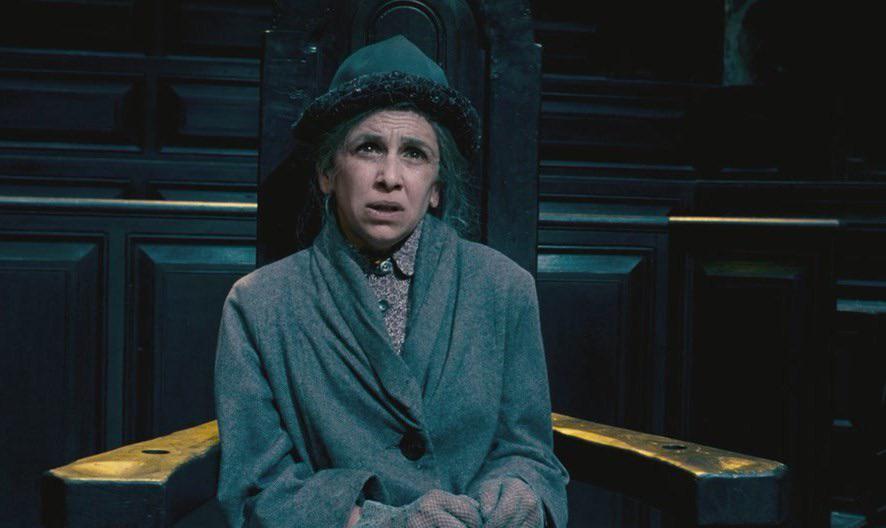
Nobody, within the Wizarding universe or without, has ever accused this of being Dumbledore’s finest moment, not even Dumbledore himself. But it’s never directly confronted as wrong, and Dumbledore never takes steps to make up for the damage it caused either, so I’m including it on the list.
Dumbledore places an infant Harry in a home where he suspects that he’ll be unhappy and unloved. The Dursleys are neglectful and abusive for Harry’s whole childhood, and Dumbledore knows all about it from his spy in the neighborhood, Arabella Figg. Mrs. Figg knows exactly how the Dursleys feel about and treat their nephew: “I’m sorry I gave you such a miserable time, but the Dursleys would never have let you come if they’d thought you enjoyed it” (Order of the Phoenix).
It’s particularly jarring that Dumbledore doesn’t step in with Harry’s magic-hating relatives when we consider what we know about Obscurials now. He has first-hand knowledge of the kind of damage that repressing a child’s inner magic can do (with Credence Barebone and possibly his own sister Arianna), so the fact that Harry’s left in an environment that could lead to a similar tragedy is disturbing.
Dumbledore believes it’s worth it, since Harry’s staying with the Dursleys secures him powerful magical protection. But was the price for that protection too high? Where is the limit of acceptable behavior from the Dursleys in exchange for that protection? Or did Dumbledore even bother drawing one?
Dobby: He deliberately exploits the Dursleys’ treatment of Harry
Dobby knows exactly what he’s doing when he smashes a pudding in the Dursleys’ kitchen in Chamber of Secrets. His stated purpose is to keep Harry from going back to Hogwarts, but in any normal household, would the dropping of a dessert result in so dramatic a response as refusing to allow a child his education? Absolutely not. Only the Dursleys would overreact to the extent of imprisoning and starving their nephew in his own bedroom.
Which means that Dobby, like Mrs. Figg, knows exactly what the Dursleys are like, but he takes it a step further. He deliberately enrages them with the intent of worsening their abuse of Harry, in the name of keeping him safe.
Fred and George: They create Love Potions
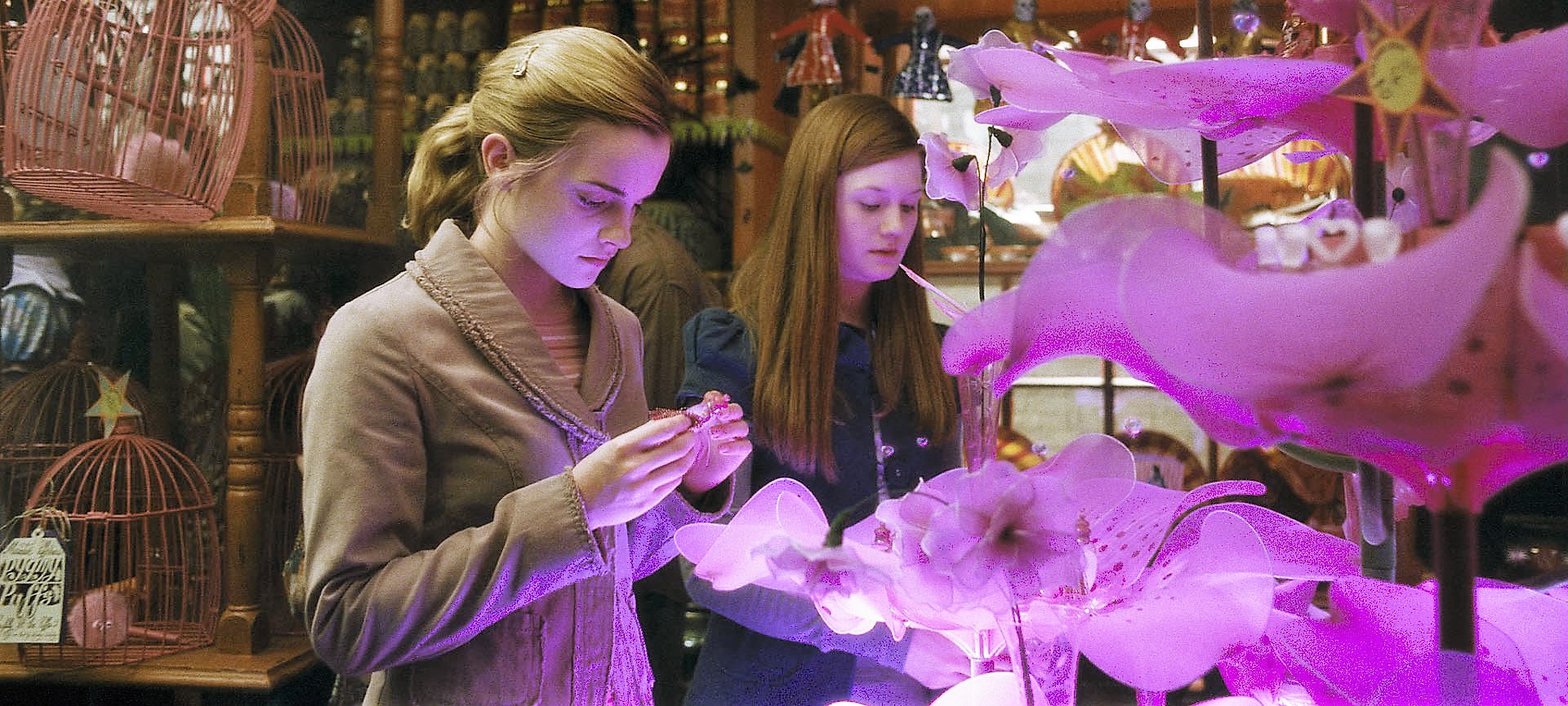
At the end of the day, Love Potions are really very similar to the Imperius Curse. They are both used to control a person’s mind and actions, overwriting free will. And Love Potions are pointed out in particular as being used to enslave and rape a person, even long-term. It’s how Voldemort was conceived, after all—his mother used a Love Potion to force his father to marry and have a child with her.
So the facts that the Wizarding World countenances Love Potions and that the Weasley Twins actively produce them have always seemed out of place and discordant. The Twins wouldn’t dedicate their time and talents to something that dangerous, right? Or would they?
Honorable mentions
- Harry, Ron, and Hermione deal in bad faith with Griphook (Deathly Hallows).
- Dumbledore plots with a burgeoning Dark Lord to overthrow all Muggles and subject them to Wizarding rule (pre-series).
- Harry casts a spell he doesn’t know anything about at Draco and almost kills him (Half-Blood Prince).
- Ron abandons Harry in his time of need…twice (Goblet of Fire and Deathly Hallows).
- Remus tries to abandon his family when his wife falls pregnant (Deathly Hallows).
- The Marauders bully Snape when they’re all kids, and Snape bullies school children as an adult (let me count the ways).
So what do you think of our list? What did we leave out? Which of the actions listed are justified in context, and which are inexcusable? Let us know in the comments!

